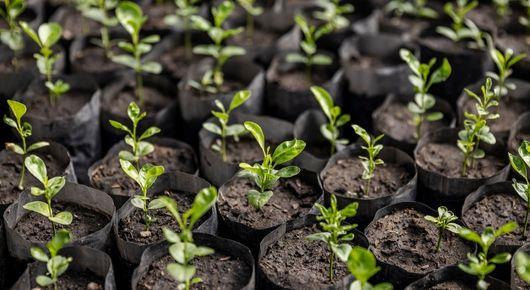Permaculture and community seeds production are key paths to a greener agriculture

©FAO/Luis Tato
All across Europe and Central Asia, there is a growing desire among consumers to buy local healthy food that is produced in a way that is less harmful to the environment and biodiversity. Permaculture, foraging spontaneous plants and community seeds production are interrelated approaches implemented in the region to glean and grow food in a sustainable manner. To broaden knowledge on these traditional and innovative approaches and their benefits, FAO organized a regional workshop on permaculture and community seed development in collaboration with Gradina Moldovei, a Moldovan association specialized in the topic.
The workshop aimed to promote permaculture development in Europe and Central Asia as part of the Regional Technical Platform on Green Agriculture, through facilitating sharing of knowledge and experience on permaculture and community seeds production among countries of the region. Proven examples and lessons learned from Italy, Kyrgyzstan, Republic of Moldova, Russian Federation, and Ukraine helped shed light on the many possibilities permaculture offers.
Speakers highlighted the main findings and conclusions from three new related FAO reports: Regional Review on Permaculture, Eat your way through nature and the Review report on community seeds production in the Europe and Central Asia region.
“Today’s workshop was the first of this kind within FAO to start a dialogue on permaculture, foraging plants, and community seeds development in Europe and Central Asia and the existing initiatives and practices,” said Sophie Treinen, communication for development specialist at FAO. “Permaculture has the potential for better production with less inputs. The three subjects are interrelated as they show the relationship with human and soil microbiome and the importance of biodiversity in our ecosystem”
It's hard to pin down a single definition of permaculture. Even if there isn’t one narrow definition of permaculture, it is consistently characterized as an agricultural production system that reproduces the patterns and relationships of a natural ecosystem by, among practices such as integrating biodiversity, or combining crop and animal production in a nature-based, yet efficient manner. Permaculture can help restore soil fertility, as well as conserve animal and plant genetic resources.
Seeds represent one of the key elements in permaculture systems, as by saving open pollinated, heirloom or non-hybridized seeds producers develop crop varieties, which suits their needs in terms of adaptability to local climate conditions, and resistance to pests and diseases. The availability and accessibility of quality (non-hybridized) seeds of a diverse range of adaptable crop varieties is critical for ensuring food and livelihood security and eradicating hunger, strengthening both formal and informal seed systems is therefore a major entry point for the sustainable use of plant genetic resources in strengthening food and agriculture systems (FAO, 2015).
FAO recognizes the important contribution to seed production by the informal community of private seed savers, community seed banks, seed savers’ networks, scientific institutes, and non-government organizations. “Community seed production systems represent a unique opportunity for smallholder farmers to improve agrobiodiversity in the production system, enhance the conservation of local varieties better suited to local production specificities,” added by Tania Santivanez, FAO agriculture officer.
The plenary and group discussions also highlighted the major constraints, strengths, and opportunities of adopting permaculture and promoting community seed production. As participants agreed on during the group discussion, permaculture has several advantages, including the low maintenance level and the long-term environmental benefits. Recommendations of the priority needs, outcomes and actions from the plenary and breakout session relate to the improvement of the followings areas: awareness and policy, information management and networking, knowledge and capacity strengthening, market access, and some more.
15 November 2022, Budapest, Hungary
